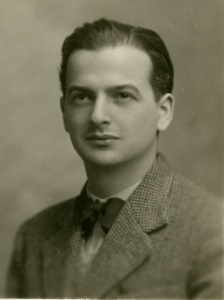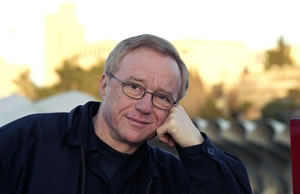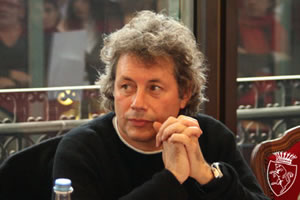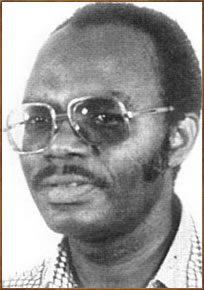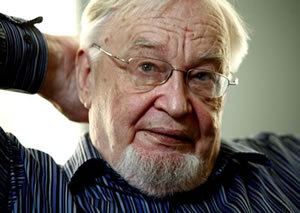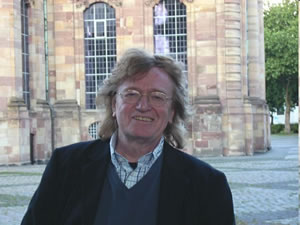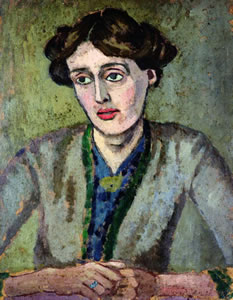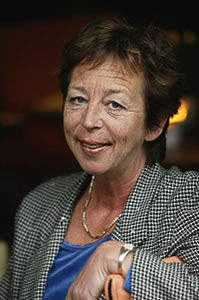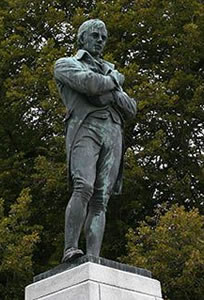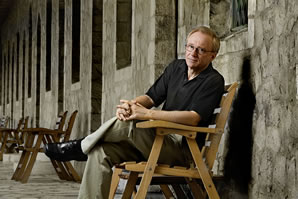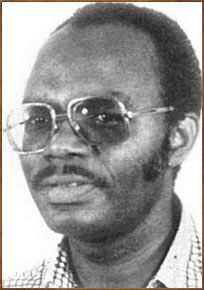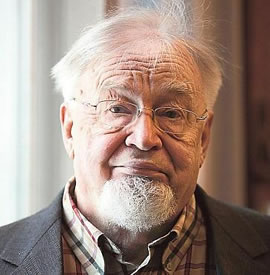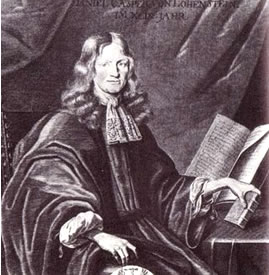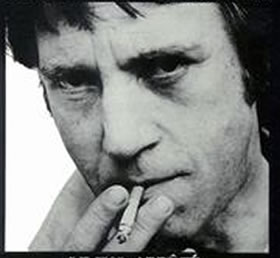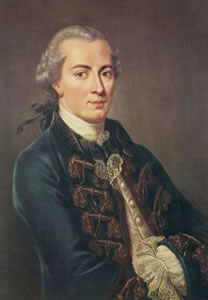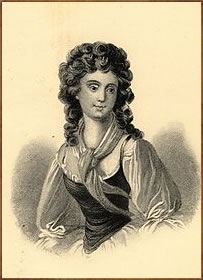De Engelse schrijfster Virginia Woolf werd geboren op 25 januari 1882 te Londen. Zie ook mijn blog van 25 januari 2007 en ook mijn blog van 25 januari 2008.
Uit: Mrs. Dalloway
„MRS. DALLOWAY said she would buy the flowers herself.
For Lucy had her work cut out for her. The doors would be taken off their hinges; Rumpelmayer’s men were coming. And then, thought Clarissa Dalloway, what a morning-fresh as if issued to children on a beach.
What a lark! What a plunge! For so it had always seemed to her, when, with a little squeak of the hinges, which she could hear now, she had burst open the French windows and plunged at Bourton into the open air. How fresh, how calm, stiller than this of course, the air was in the early morning; like the flap of a wave; the kiss of a wave; chill and sharp and yet (for a girl of eighteen as she then was) solemn, feeling as she did, standing there at the open window, that something awful was about to happen; looking at the flowers, at the trees with the smoke winding off them and the rooks rising, falling; standing and looking until Peter Walsh said, “Musing among the vegetables?”-was that it?-“I prefer men to cauliflowers”-was that it? He must have said it at breakfast one morning when she had gone out on to the terrace-Peter Walsh. He would be back from India one o£ these days, June or July, she forgot which, for his letters were awfully dull; it was his sayings one remembered; his eyes, his pocket-knife, his smile, his grumpiness and, when millions of things had utterly vanished-how strange it was!-a few sayings like this about cabbages.
She stiffened a little on the kerb, waiting for Durtnall’s van to pass. A charming woman, Scrope Purvis thought her (knowing her as one does know people who live next door to one in Westminster); a touch of the bird about her, of the jay, blue-green, light, vivacious, though she was over fifty, and grown very white since her illness. There she perched, never seeing him, waiting to cross, very upright.“
Virginia Woolf (25 januari 1882 – 28 maart 1941)
Portret door Roger Fry
De Engelse schrijver William Somerset Maugham werd geboren in Parijs op 25 januari 1874. Zie ook mijn blog van 25 januari 2007 en ook mijn blog van 25 januari 2008.
Uit: The ant and the grasshopper
“I suppose every family has a black sheep. Tom had been a sore trial to his for twenty years. He had begun life decently enough: he went into business, married, and had two children. The Ramsays were perfectly respectable people and there was every reason to suppose that Tom Ramsay would have a useful and honourable career. But one day, without warning, he announced that he didn’t like work and that he wasn’t suited for marriage. He wanted to enjoy himself. He would listen to no expostulations. He left his wife and his office. He had a little money and he spent two happy years in the various capitals of Europe. Rumours of his doings reached his relations from time to time and they were profoundly shocked. He certainly had a very good time. They shook their heads and asked what would happen when his money was spent. They soon found out: he borrowed. He was charming and unscrupulous. I have never met anyone to whom it was more difficult to refuse a loan. He made a steady income from his friends and he made friends easily. But he always said that the money you spent on necessities was boring; the money that was amusing to spend was the money you spent on luxuries. For this he depended on his brother George. He did not waste his charm on him. George was a serious man and insensible to such enticements. George was respectable. Once or twice he fell to Tom’s promises of amendment and gave him considerable sums in order that he might make a fresh start. On these Tom bought a motor-car and some very nice jewellery. But when circumstances forced George to realize that his brother would never settle down and he washed his hands of him, Tom, without a qualm, began to blackmail him. It was not very nice for a respectable lawyer to find his brother shaking cocktails behind the bar of his favourite restaurant or to see him waiting on the box-seat of a taxi outside his club. Tom said that to serve in a bar or to drive a taxi was a perfectly decent occupation, but if George could oblige him with a couple of hundred pounds he didn’t mind for the honour of the family giving it up. George paid.“
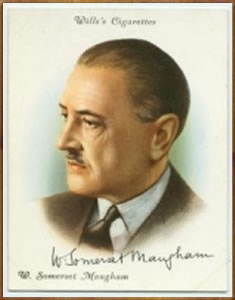
William Somerset Maugham (25 januari 1874 – 16 december 1965)
De Nederlandse schrijfster Renate Dorrestein werd geboren in Amsterdam op 25 januari 1954. Zie ook mijn blog van 25 januari 2007en ook mijn blog van 25 januari 2008.
Uit: Mijn zoon heeft een seksleven
“Ik was net met mijn zusje aan het bellen op het moment dat het moet zijn gebeurd. Had me onder het praten een glas wijn ingeschonken, de gordijnen dichtgedaan, lampen aangestoken. Bij mij was het kwart over zes, mijn werk zat erop.
Voor Francien niet, bij haar was de dag pas half om. Zij fokt paarden in Saugatuck, Michigan, samen met haar vriendin Nell. Ze wonen in een trailer op de stoeterij, kijken ’s nachts naar heldere sterren aan een onvervuilde hemel, baden een groot deel van het jaar in ijskoud water en lopen op laarzen die ze kopen bij een oude indiaanse vrouw. Ma zegt altijd: Ik heb heus geen moeite met Franciens persoonlijke leven en Nell is een lieve schoondochter, maar waarom niet een beetje lippenstift. Ik zou zelf niet weten waarom wel, maar ma uiteraard des te meer.
We hadden het over niets bijzonders. Francien vertelde hoe ze ’s ochtends vroeg in haar pick-up op pad was gegaan om een bestelling prikkeldraad op te halen. Op de terugweg had ze bij een kraam appels gekocht om cider van te maken. Nu zat ze weer thuis, in haar keukentje van golfplaat. Nell en zij hadden net warme broodjes gegeten. Ook bij haar was het dus een doodgewone dag, een zoals alle andere, alleen besef je pas hoe geweldig het alledaagse is als je rust wordt verstoord.“
Renate Dorrestein (Amsterdam, 25 januari 1954)
De Schotse dichter Robert Burns werd geboren op 25 januari 1759 in Alloway, Ayrshire. Zie ook mijn blog van 25 januari 2007 en ook mijn blog van 25 januari 2008.
The Ploughman’s Life
As I was a-wand’ring ae morning in spring,
I heard a young ploughman sae sweetly to sing;
And as he was singin’, thir words he did say, –
There’s nae life like the ploughman’s in the month o’ sweet May.
The lav’rock in the morning she’ll rise frae her nest,
And mount i’ the air wi’ the dew on her breast,
And wi’ the merry ploughman she’ll whistle and sing,
And at night she’ll return to her nest back again.
I Murder Hate
I murder hate by flood or field,
Tho’ glory’s name may screen us;
In wars at home I’ll spend my blood-
Life-giving wars of Venus.
The deities that I adore
Are social Peace and Plenty;
I’m better pleas’d to make one more,
Than be the death of twenty.
I would not die like Socrates,
For all the fuss of Plato;
Nor would I with Leonidas,
Nor yet would I with Cato:
The zealots of the Church and State
Shall ne’er my mortal foes be;
But let me have bold Zimri’s fate,
Within the arms of Cozbi!
Robert Burns (25 januari 1759 – 21 juli 1796)
Standbeeld in Stanley Park, Vancouver
De Israëlische schrijver David Grossman werd geboren op 25 januari 1954 in Jeruzalem. Zie ook mijn blog van 25 januari 2007 en ook mijn blog van 25 januari 2008.
Uit: Writing in the Dark
“Explaining the process of inspiration, for me, is like trying to explain what occurs in a dream. In both cases we must resort to using words to describe an experience that by nature resists definition. In both cases we can rationally analyze the events and consider, for example, the themes and characters that may have influenced the dreamer and the needs that led him to conjure up these particular influences rather than others in his dream. But we will always feel that the essence of the dream, its secret, the unique glimmer of contact between the dreamer and the dream, remains an impenetrable riddle.
I remember what I experienced when I felt I was under the rays of a vast and inspiring literary power—when I read Kafka’s Metamorphosis, for example, or Yaakov Shabtai’s Past Continuous, or Thomas Mann’s Joseph and His Brothers. I have no doubt that some part of me, perhaps my innermost core, seemed to be in the realm of a dream. There was a similar intrinsic logic, and a direct dialogue conducted with the deepest and most veiled contents of my soul, almost without the mediation of consciousness.
When I talk, then, of this or the other author and how he or she touched my life and influenced my writing, I know that it is merely the story I tell myself today, in a waking state, under the spotlights, filtered through the natural sifting process of memory.“
David Grossman (Jeruzalem, 25 januari 1954)
De Italiaanse schrijver Alessandro Baricco werd geboren op 25 januari
1958 in Turijn. Zie ook mijn blog van 25 januari 2007 en ook mijn blog van 25 januari 2008.
Uit: City (Vertaald door Ann Goldstein)
“Larry! . . . Larry! . . . Larry Gorman is approaching our position . . . he’s surrounded by his people . . . the ring is mobbed . . . LARRY! . . . it’s not easy for the champion to make his way through . . . there’s Mondini, his coach . . . a lightning-fast win tonight, here at the Sony Sports Club, let’s recap, just 2 minutes 27 seconds is all . . . LARRY, here, Larry, we’re on the air, live on radio . . . Larry . . . we’re on the air, so, fast work . . .”
“Is this microphone working?”
“Yes, we’re on the air.”
“Nice microphone, where’d you buy it?”
“I don’t buy them, Larry . . . listen . . . did you think it would be over so quickly or . . .”
“My sister would like that a lot . . . “
“I mean . . . “
“No, seriously. You know, she imitates Marilyn Monroe, she sings and she’s the spitting image of Marilyn, the same voice, I swear, only she doesn’t have a microphone . . . “
“Listen, Larry . . . “
“Usually she manages with a banana.”
“Larry, you want to say something about your opponent?”
“Yes. I want to say something.”
“Go ahead.”
“I want to say something about my opponent. My opponent is called Larry Gorman. Why do they keep on setting me up with those zeroes wearing gloves and no clothes? They’re always under my feet. So eventually I have to knock them down.”

Alessandro Baricco (Turijn, 25 januari 1958)
De Surinaamse dichter en journalist Jozef Hubert Maria Slagveer werd geboren in Totness op 25 januari 1940. Slagveer volgde de Sint Antonius-school te Mary’s Hope en de Algemene Middelbare School (AMS) te Paramaribo. Vervolgens vertrok Slagveer naar Nederland waar hij journalistiek studeerde aan de Vrije Universiteit te Amsterdam. In 1967 keerde hij naar Suriname terug. Slagveer werkte aanvankelijk op de afdeling voorlichting van het ministerie van onderwijs, maar begon in 1971 samen met Rudi Kross een eigen persbureau, Informa geheten, dat een dagelijks bulletin en een weekblad (Actueel) uitgaf. Hij was voorstander van de onafhankelijkheid van Suriname en wilde samen met Rudi Kross de NPS omvormen tot een socialistische beweging. Slagveer viel in 1975 in ongenade bij de regering-Arron. Na de onafhankelijkheid werd Slagveer spreekbuis van de ontevreden sergeants van het Nationale Leger van Suriname. Nadat zij op 25 februari 1980 een staatsgreep hadden gepleegd, werd hij aangesteld tot hun woordvoerder en propageerde hij hun bewind. Legerleider Bouterse zocht vanaf eind 1980 via Slagveer toenadering tot de leiders van de oude politieke partijen, onder wie Jaggernath Lachmon. Gaandeweg begon Slagveer het regime te bekritiseren. Waarschijnlijk wegens die kritiek werd Slagveer in de nacht van 7 op 8 december 1982 opgepakt. Op 8 december werd hij op 42-jarige leeftijd te Fort Zeelandia vermoord.Slagveer debuteerde in 1959 in de Dichtershoek van het Nederlandse Algemeen Handelsblad. Zijn proza en poëzie in het Sranan en Nederlands is traditioneel vormgebonden en fel nationalistisch-geëngageerd.
Plensregen
plensregen kom
en was ons lichaam
plensregen kom
bevrijd onze geest
laat ons nieuwe kleren dragen
plensregen kom
laat ons werken aan een nieuw Suriname
plensregen kom
laat ons onszelf zijn
plensregen kom
kom plensregen
was het slaafse denken ver van ons weg
was het weg plensregen
kom was Suriname schoon!
Vertaald door Michel Berchem
Jozef Slagveer (25 januari 1940 — 8 december 1982)
De Finse dichter, toneelschrijver en uitgever Paavo Juhani Haavikko werd geboren in Helsinki op 25 januari 1931. Hij wordt beschouwd als een van de belangrijkste schrijvers in zijn land. Zo won hij in 1984 de Neustadtprijs voor literatuur. Haavikko debuteerde in de jaren vijftig met Tiet etäisyyksiin. In zijn volgende bundel Tuuliöinä (1953, Winderige nachten) gebruikt hij de wind als centrale metafoor voor hedendaagse angsten en vervreemding. Bekende bundels van Haavikko zijn ook Synnyinmaa (1955) en Lehdet lehtiä (1958). Zijn poëzie werd wel vaak als moeilijk toegankelijk beschouwd. In de jaren zestig sloop er meer sociale kritiek in zijn werk. In zijn verzamelde korte verhalen Lasi Claudius Civiliksen salaliittolaisten pöydällä (1964) toonde hij zich verwant met de nouveau roman, terwijl zijn verzameld toneelwerk Näytelmät (1978) aanleunde bij het theater van het absurde. Van 1967 tot 1983 was hij literair directeur van de uitgeverij Otava en van 1989 tot zijn dood was hij eigenaar van de uitgeverij Art House
Uit: 10 Poems of the Year 1966
And so she almost stops her breathing
like the wind that has to draw breath immediately
all the more violently.
And so she becomes for a moment smaller than any garment
she might be wearing now.
Everything in this world into which there is only one way to arrive,
but so many ways to leave,
that it makes us different people.
A public place, this world, and one doesn’t always know
whether this is what is called a room, and whether this room
is growing darker, by gusts.
*
In the panelled room I stop, breathe Autumn,
but, no, it isn’t you.
Is is that not even wood, carved into ceilings and walls
has a scent that would last.
And yet, those two were so eternal in the high days of summer,
when the warm wind on the skin is cool among the shadows,
and the grasses have vertigo.
Paavo Haavikko (25 januari 1931 – 6 oktober 2008)
De Duitse dichter, schrijver, musicus en filmmaker Alfred Gulden werd geboren op 25 januari 1944 in Saarlouis. Al in 1959 richtte hij zijn eerste toneelgroep op. Gulden studeerde germanistiek en theaterwetenschappen in Saarbrücken. Naast schrijver en filmmaker is hij ook schrijver van liederen (zowel tekst als muziek. Gulden schrijft zeer veel in het Saarlandse dialect.
NACHTSCHICHT
Zwanzig Jahre im Dunkeln
Tagsüber geschlafen und nachts
gearbeitet.
Sonntags wie werktags, jahr-
aus, jahrein , Sommer wie Winter, Tag
und Nacht verwechselt, verkehrtrum
gelebt.
Und im Urlaub nicht mehr hinten
und vorn gewußt die ersten paar
Tage, dann war er vorbei, zu
spät. Wieder die Arbeit, wieder von
vorn: nachts wach und am Tag
geschlafen.
Die Kinder sind groß geworden und
haben Kinder bekommen.
Die Haare sind grau geworden,
die Augen müde.
Und jetzt soll das alles
anders werden? Jetzt, wo ich
nicht mehr anders kann? Wo die Nacht
der Tag und der Tag die Nacht ist
für mich, soll ich
gehn?
Alfred Gulden (Saarlouis, 25 januari 1944)
De Duitse schrijfster en dichteres Eva Zeller werd geboren op 25 januari 1923 in Eberswalde. Zie ook mijn blog van 25 januari 2007.
Glauben
Wenn jede Pore meiner Haut
hören könnte. Wenn ich so
viele Augen hätte, wie am
Mantelsaum seltener Muscheln sitzen,
ich fragte dennoch töricht:
Was für eine Stimme wirbt um mich
wie
um eine Geliebte?
und was ist das für ein Licht ,
soll ich noch auf ein
anderes warten?
Auf einer Waage mit
kleinen und kleinsten
Kupfergewichten wird
meine Antwort gewogen .
Wie die Zungen spielen.
Eva Zeller (Eberswalde, 25 januari 1923)
Portret door Helene Menne-Lindenberg
De Duitse dichter Daniel Caspar von Lohenstein werd geboren op 25 januari 1635 in Nimptsch, in Silezië. Zie ook mijn blog van 25 januari 2007.
Inschrift des Tempels der Ewigkeit
Ihr dürres Volk, leblose Leute, todte Stumme,
Ihr Sterblichen, die ihr euch wünscht zu leben,
Die ihr den hellen Tag für Nacht,
Die Krone für Gefängniß, Freiheit für die Ketten,
Für Kerker Ruhm, für Wenig Alles alle,
Die ihr für Nebel Glanz, für Dünste Sonnenschein,
Für’s Grab den Thron, den Zepter für das Grabescheit,
Für Nichts nicht Viel, den Himmel für die Erden,
Für Asche Gold,
Das Leben für den Tod,
Die Seide für den Koth,
Verwechseln wollt!
Ihr Menschen, die ihr Götter wollet werden,
Die ihr den Kitzel schnöder Eitelkeit,
Der Träume Nichts, der Ehrsucht süße Pein,
Der Wehmuth Wermuth, der Wollüste Galle
Verschmäht und euch vom Dorn’ auf Rosen wollet betten!
Kommt, kommt! hier segelt her und macht
Den Lebensnachen an, wollt ihr erheben
Den Prei
s der Ewigkeit, das Wahre für das Dumme!
Daniel Caspar von Lohenstein (25 januari 1635 – 28 april 1683)
De Russische zanger, acteur en dichter Vladimir Semjonovitsj Vysotsky werd geboren op 25 januari 1938 in Moskou. Zie ook mijn blog van 25 januari 2007.
Go ahead, drink
Go ahead, drink!
Luck’s on your side.
Your life’s a cent, but
Mine’s a bull’s eye.
You, with the felt there!
Let’s bet shall we?
Me from 90 yards
And you right here.
My cards are bad,
My fate I’ll face;
I’ve got a ten and
An ace of spades.
Because on that bet you
Shot at point-blanc;
But I’m a sharpshooter and
You’re a gambler, right?
Now where could you go?
My shot hit hard:
And 10 in the head,
9 in the heart.
Just as a black dot
On a white leaf.
…That night became
a part of me…
Vertaald door Liza Simonova
Vladimir Semjonovitsj Vysotsky (25 januari 1938 – 25 juli 1980)
De Duitse schrijver en filosoof Friedrich Heinrich Jacobi werd geboren in Düsseldorf op 25 januari 1743. Jacobi was bevriend met de jonge Goethe, oefende met zijn briefromans Eduard Allwills Papiere (1775-1776) en Woldemar (1779) grote invloed uit op de Sturm und Drang-beweging. Ook in zijn theoretische geschriften keerde hij zich tegen het rationalisme, dat zijns inziens onafwendbaar tot ‘nihilisme’ (een neologisme van Jacobi) moest leiden..
Uit: Woldemar
„Eberhard Hornich, ein angesehener Handelsmann zu B., hatte drey Töchter: die älteste hieß Caroline, die zweyte Henriette, und die dritte Luise. Carl Dorenburg, der sich lange Zeit in Italien und England aufgehalten hatte, und zurück nach London wollte, wo ein vortheilhaftes Etablissement auf ihn wartete, sah Carolinen, und ward von ihr gefesselt. Er war ein sanfter und herzlicher Mann, der die feinern Vergnügen mit Einfalt liebte, einen reinen und festen Geschmack hatte, und sich nie an etwas hieng, als mit innigem Gefühl und aus wahrer aufrichtiger Neigung. Das Mädchen nahm ihn gern, und der Alte willigte mit Freuden in die Heyrath mit einem Manne, der ein so vortreflicher Kaufmann und von so grossem Vermögen war. Vater und Tochtermann traten miteinander in Gesellschaft.
Dorenburgs vertrautester Freund war Biederthal, ein junger Rechtsgelehrter. Die Aehnlichkeit ihrer Neigungen, der Eifer, den sie gegenseitig in sich erweckten, die Hülfe, die sie einander leisteten, brachte jene geistige Gemeinschaft der Güter unter ihnen zuwege, welche den Neid unmöglich und das Leben so süß macht. So war ihr Verständniß zwey Jahre hindurch immer vollkommener und enger geworden.“
Friedrich Jacobi (25 januari 1743 – 10 maart 1819)
De Franse schrijfster Stéphanie Félicité Du Crest de Saint-Aubin, comtesse de Genlis, werd geboren op 25 januari 1746 in Champcéry bij Autun. Zij bestreed Madame de Staël en was als strenge katholiek ook een tegenstandster van Voltaire. Zij schreef voornamelijk opvoedkundige en historische werken.
L’oiseau, le prunier et l’amandier
Un jeune oiseau , perché sur un prunier,
Vit tout à coup un amandier :
Le bel arbre! dit-il, et quel charmant feuillage!
Allons goûter ses fruits : je gage
Qu’ils sont mûrs et délicieux.
A ces mots, fendant l’air d’un vol impétueux ,
L’oiseau bientôt, ainsi-qu’il le désire,
Se trouve transplanté sur l’arbre qu’il admire.
Lors aux amandes s’attachant,
Il veut les entamer; mais inutilement,
Et de son bec en vain il épuise la force.
Ne nous étonnons point de son raisonnement ;
Il ne jugeait que sur l’écorce.
Stéphanie de Genlis (25 januari 1746 – 31 december 1830)





